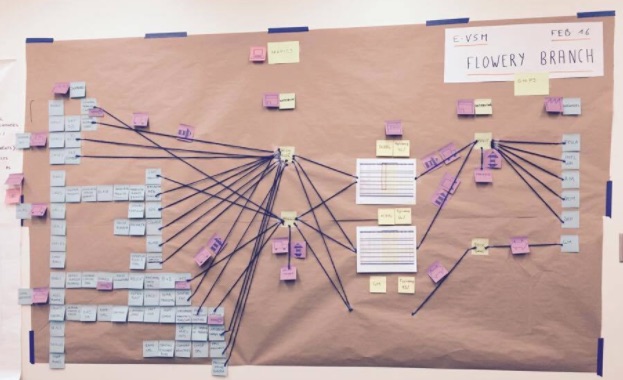 “Keep a clear vision of what you want to achieve in your career, be self-motivated in achieving this goal, and don’t get distracted but adapt to whatever unexpected challenges may be thrown your way.”
“Keep a clear vision of what you want to achieve in your career, be self-motivated in achieving this goal, and don’t get distracted but adapt to whatever unexpected challenges may be thrown your way.”
Ramachandran Balakrishnan is a Malaysian national currently residing in Georgia, where he works as a Business Controller with SKF USA, Inc. Raised in an estate (a remnant of the colonial era) in rural Malaysia, at a young age Ramachandran could not benefit from the presence of positive influences and opportunities, but always enjoyed and thrived in mathematics at school. This cultivated his early aspirations of a career in finance. Despite experiencing personal tragedy and hardship as a teenager, through his hard work and perseverance, Ramachandran not only achieved but surpassed this childhood goal by attaining the necessary qualifications and experience before launching his career as a Business Controller. This career would allow him to live and work in various countries through expat positions. All the while, Ramachandran never stopped developing his skills through company trainings and global leadership programs. Outside of his work, Ramachandran enjoys listening to music, reading, hiking, and playing tennis.
What exactly does a business controller do? What are your job responsibilities?
Currently I work at SKF, USA Inc, which is a Swedish company operating within the services and manufacturing industries. As business controller, I’m generally charged with advising the management team on financial matters, primarily cost-saving and profit-enhancing methods. Typically this involves providing consult to heads of other departments (such as approving the budget for a project), overseeing closing books at the end of the month and year, preparing material for management review meetings. Business controllers in particular have very unpredictable days in the office, because you never know the nature of the issues for the day, or who will come to your door needing your consulting, opinion, and/or approval.
이 직업을 추구하도록 동기를 부여한 것은 무엇입니까?
 I was born, bred, and educated in a small estate in Malaysia, surrounded by people with little to no education. Until the age of 12 I would say I had no real direction in life, and even started getting involved with the wrong crowd. But when I was 13 my father moved us out of the estate to a small town nearby, where I was exposed to more people who were better influences. At that time, in the mid-70s, accounting was kind of a trendy career path in Malaysia, much like IT is today in the United States. I also had the impression that accounting dealt with a lot of numbers, and I had always loved math, so that’s how I got sold on the career and started working hard in school toward that goal.
I was born, bred, and educated in a small estate in Malaysia, surrounded by people with little to no education. Until the age of 12 I would say I had no real direction in life, and even started getting involved with the wrong crowd. But when I was 13 my father moved us out of the estate to a small town nearby, where I was exposed to more people who were better influences. At that time, in the mid-70s, accounting was kind of a trendy career path in Malaysia, much like IT is today in the United States. I also had the impression that accounting dealt with a lot of numbers, and I had always loved math, so that’s how I got sold on the career and started working hard in school toward that goal.
Although I initially thought a career in finance would allow me to pursue my passion for math and numbers, I realized a Business Controller also deals with accounting principles and consulting and advising tasks. This was a pleasant discovery because I enjoy the added challenge. On a more practical note, I was motivated by the flexibility and security of a career in finance… at the end of the day, almost every industry could use a business controller and it is not the kind of job that is likely to be replaced by a computer in a few years.
Have you faced any major challenges in your journey to become a Business Controller?
When I was 17, my father passed away. At the time, it really felt like my dream was shattered, because all my life my father had been the sole breadwinner for our huge family of nine. Suddenly all my efforts and focus had to shift toward providing for the family. So, I moved to the city and lived in a squatter area while working whatever job I could get… male nurse, waiter, etc. After a while I earned enough to move into a garage-turned-bedroom, which I shared with four other boys, and I started taking night classes to attain my degree in Accounting.
With this degree, I managed to find an entry-level job position as an accounting clerk, but it was only a temporary position and I was paid hourly, so I spent a lot of evenings in the office working overtime so I could earn some extra pay. After one year of this experience, my boss took me aside during a company Christmas party and told me not to come back to work after New Years’, because I was being laid off. I spent the next year living with my married older sister, and taking any job that would pay.
Then I got my big break when, one day, an ex-boss came into the restaurant where I was working as a waiter. He had noticed I was a hard worker when I worked for him, and was absolutely astounded that I was waiting tables. He offered me a job on the spot. I will never forget that day, 1st April 1981 (thankfully his offer was not a prank!), when I got my first permanent accounting job. Most of all, I will never forget getting that first paycheck and feeling like I didn’t have to struggle anymore, maybe for the first time in my life. I continued to work hard at the job, for an average of 10-12 hours per day, and although I began as a junior accountant, I was receiving promotions roughly every six months. That was really when my career started to take flight.
Anyone who is lucky enough to be able to follow a more straightforward career path should take full advantage of the opportunity, but if there are uncontrollable circumstances in your life that derail you from your path, remember that there is no “one path,” and that staying positive, not giving up, and working hard will pay off.
What would you say are your proudest professional achievements?
When I first joined SKF, it was a Swedish start-up just starting to establish itself. Today, SKF is a global world leader in ball-bearing manufacturing. I’m proud to have played a role- however small- in its development.
On a more personal note, when I first started working in SKF Malaysia, I met a lot of expats (most of whom were professionals from abroad who were brought in to share their expert knowledge with the local team), and aspired to one day have a position like them.
At that point, I made a promise to myself that one day I too would have an expat position. Although I had no idea how to approach this goal, my conviction was unfaltering and one day not long after, someone who noticed my good work mentioned there was a position open in South Korea. I applied, interviewed, and got selected! Since then, I have had the opportunity to work as an expat in China, Belgium, and now in the United States.
As an 8 year old living in the estates of Malaysia, the opportunity to live the American Dream in the U.S. was absolutely an alien concept; totally out of the picture. Today I’m so glad I have had these opportunities to provide a better life for my family. I only wish my father could have seen it all.
What are the main qualities or skills needed to be a Business Controller?
 You must complete your tasks in a timely manner, and with accuracy. It’s also important to ‘go by the books,’ meaning having strict adherence to accounting principles, as well as your moral principles. Balancing good leadership with being a team player is key, as is being a self-starter and having good organization skills. Finally, participation is also very important for Business Controllers. Express your views and give your best consult in meetings, because your input can and should drive the profitability of the company.
You must complete your tasks in a timely manner, and with accuracy. It’s also important to ‘go by the books,’ meaning having strict adherence to accounting principles, as well as your moral principles. Balancing good leadership with being a team player is key, as is being a self-starter and having good organization skills. Finally, participation is also very important for Business Controllers. Express your views and give your best consult in meetings, because your input can and should drive the profitability of the company.
조언의 마지막 말은?
Have an open mind to learning, because in this field you will constantly have to adapt to new systems within your organization, or different organizations altogether, as well as the global economy. Furthermore, this is a career that requires a significant dedication to your training in the beginning, but will reap a lot of rewards later on, such as good pay and stable employment. Also, throughout your career you should never compromise on the responsibility that comes with the job. You may be dealing with large amounts of money and giving financial consult which can render big consequences, all of which as a business controller you will be held accountable for.
Lastly, try to keep a clear vision of what you want to achieve in your career, be self-motivated in achieving this goal, and don’t get distracted, but adapt to whatever unexpected challenges may be thrown your way.
Thank you very much, Ramachandran, for sharing your inspiring career story with us!




